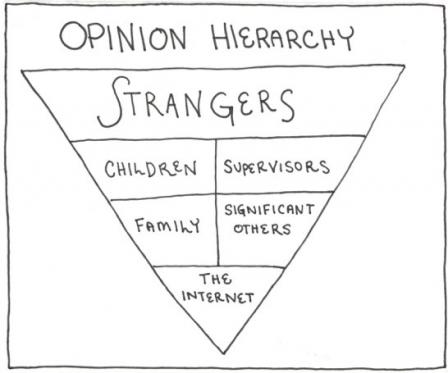My dad called me to talk about sex the other day, more specifically: my sex life. It wasn’t a chat I ever imagined having with my adorable little Russian father, but in a small way I knew it was coming. You see, he had just finished reading a pre-release copy of my debut novel, which meant he’d just finished reading a few salacious stories from my intimate life.
“You’re such a beautiful writer,” my father told me over the phone, “Why ruin it with such gimmicks. It’s pornographic!” He was talking about a particularly explicit story I’d included from my teen years. The good details are in the book, but I’ll say this: my dad kept yelling “Why do you have to tell the whole world about 65-ing!” His shaky grasp of American innuendos, coupled with his Russian accent made for very entertaining chiding.
I stifled a giggle and attempted to defend my work. I told him that I simply wrote with candor. That teenage lust is clumsy and hilarious, and that it should be written about because being a teenager is frustrating and terrifying. That he was my dad, so of course the words on the page would feel heavier, more intense to him. It wasn’t some author recalling her first time seeing a boy naked, it was his daughter recalling a maybe-too-vulnerable time in her life. Ultimately, we agreed to disagree and got off the phone.
A few years ago, a critical call from my father would’ve crushed my spirit. It would have derailed my creative workflow and taken me weeks to gather up the confidence to come back to the page. I’ve since learned to respect my dad’s opinion without feeling the need to listen to it. I love my dad! He is my inspiration. He is the reason I wrote the book. I want him to love it! (Which I think he does, aside from the sparse “pornographic” parts.) But I’ve also learned how to co-exist with opinions that clash with my own.
My dad isn’t the first person to criticize my writing, and he certainly isn’t going to be the last – although he probably will be the most supportive and caring critic. As I slowly claw my way up the invisible ranks of writer-world, there are going to be more and more critical voices in my life – whether I want them or not. So, I’ve chosen to want them. It’s easier to absorb all opinions and filter out those that aren’t helpful, then it is to block everything out. It’s simply unrealistic to think someone is strong enough (especially people as sensitive and praise-dependent as writers) to completely ignore what other people think of them.
I have such an issue with “ignoring the haters” as preached by teenagers and reality TV stars. Delicate people are constantly told to grow thick skin and disregard the opinions of others. But the problem with growing thick skin is it’s stiff and cumbersome. Thick skin weighs you down and develops unsightly calluses that clog creativity. Other people’s opinions matter; they can be empowering, enlightening, motivating, and all sort of other “ings.”
There’s somewhat of an art to utilizing opinions for your benefit; it’s helps to rank them from most to least valuable. That way you can turn down the volume on opinions that are distracting and focus more on the ones that can inform your work instead. Sometimes, the judgements that come from the most well-meaning of people are the ones that can be most harmful to your creative process, so it can be difficult to figure out who’s thoughts to incorporate into your work.
Included below is a chart of how people’s opinions are weighted in my brain:

STRANGERS—If someone doesn’t know you but takes the time to give you their heartfelt opinion in person, you should listen. Strangers tend to be the most honest because they don’t have anything invested in your relationship.
CHILDREN—Children have not yet been marred by the rigidly cloaked world of adult etiquette, making them brutally honest. If you’re working on something, run it by children first! Unless you’re, like, opening your own dildo factory, then maybe wait until they’re in middle school—the age kids learn about sex and dildos these days, it seems.
SUPERVISORS—People who are above you in the job food chain tend to give you a good evaluation of things. That is, if they’re good at their job. If they’re bad at their job, then they’re probably going to lie and manipulate you into a little bowl of jelly to delicately place at the foot of their hollow throne.
FAMILY—This is very dependent on the type of family. If your family is like my mom, then their opinion will cut into you with sharpened edges of brutal honesty. You’ll always know what your harshest critic is thinking and that’s invaluable. If your family is like my dad (usually), then everything you create exists in a vacuum of magic. You’ll have a hard time deciphering whether what you’re doing is truly magnificent or not, but your confidence will balloon into an indestructible bubble of light, ideas, and creativity. But remember, everyone who is close to you is biased so their opinions may have a slight bent.
SIGNIFICANT OTHERS—Usually, people who are trying to have sex with you are not going to give you a clear picture of their opinion and that’s fine, they shouldn’t. It’s very dangerous to seek the acceptance of your significant other. Just use them for body warmth, intellectual conversation, and procreating—if that’s something you’re into.
INTERNET—The internet is a diseased tumor growing inside of the colon of a murderous hobgoblin. The opinions there might be benign or malignant, but either way, you should cut them out of your life as quickly as possible.
It’s perfectly acceptable to invite other people’s opinions into your life but remember the opinion that’s most important is your own.
Tidak ada komentar:
Posting Komentar